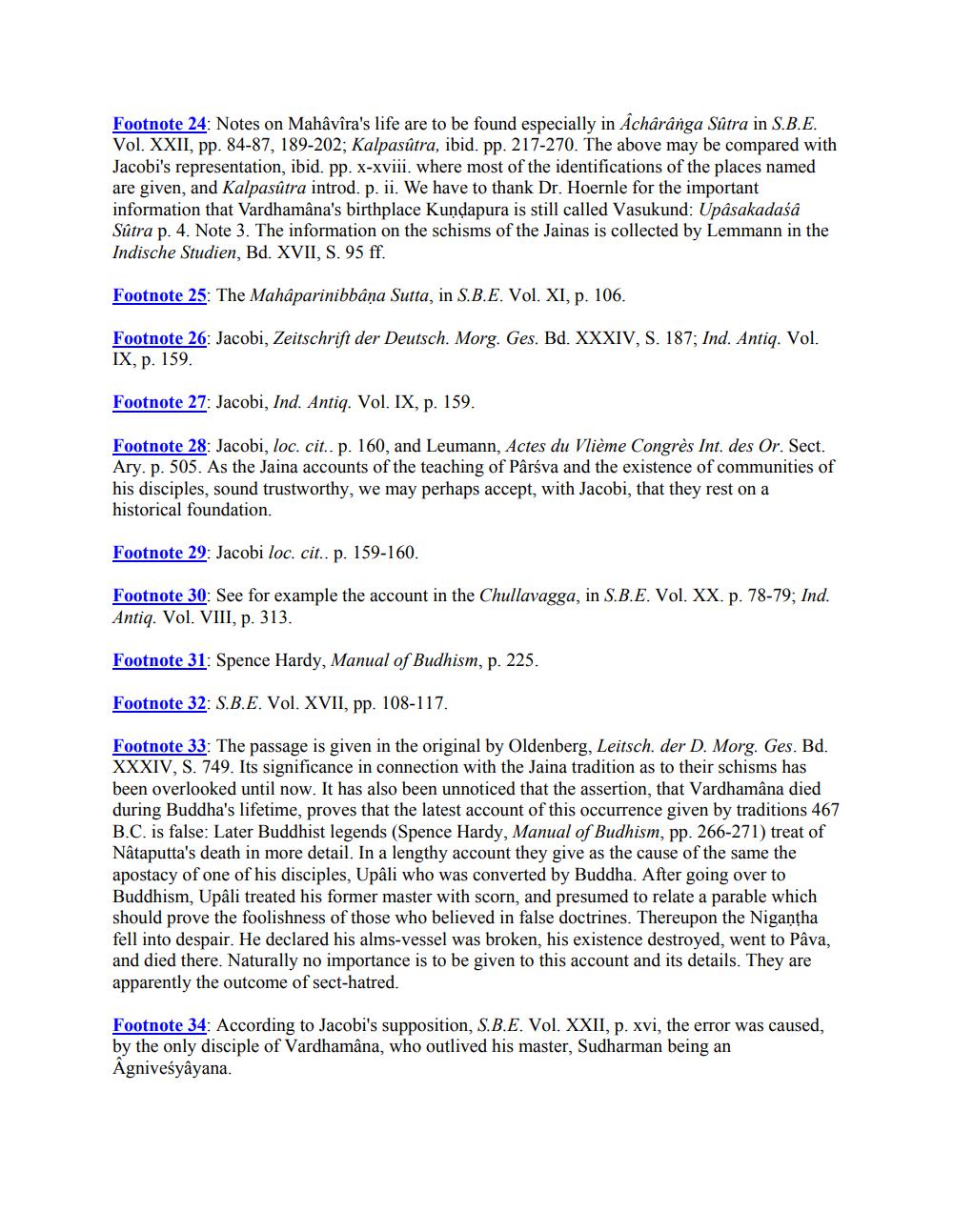________________
Footnote 24: Notes on Mahâvîra's life are to be found especially in Achârânga Sútra in S.B.E. Vol. XXII, pp. 84-87, 189-202; Kalpasútra, ibid. pp. 217-270. The above may be compared with Jacobi's representation, ibid. pp. x-xviii. where most of the identifications of the places named are given, and Kalpasútra introd. p. ii. We have to thank Dr. Hoernle for the important information that Vardhamâna's birthplace Kundapura is still called Vasukund: Upåsakadasa Sútra p. 4. Note 3. The information on the schisms of the Jainas is collected by Lemmann in the Indische Studien, Bd. XVII, S. 95 ff.
Footnote 25: The Mahaparinibbâna Sutta, in S.B.E. Vol. XI, p. 106.
Footnote 26: Jacobi, Zeitschrift der Deutsch. Morg. Ges. Bd. XXXIV, S. 187; Ind. Antiq. Vol. IX, p. 159.
Footnote 27: Jacobi, Ind. Antiq. Vol. IX, p. 159.
Footnote 28: Jacobi, loc. cit. p. 160, and Leumann, Actes du Vlième Congrès Int. des Or. Sect. Ary. p. 505. As the Jaina accounts of the teaching of Pârśva and the existence of communities of his disciples, sound trustworthy, we may perhaps accept, with Jacobi, that they rest on a historical foundation.
Footnote 29: Jacobi loc. cit.. p. 159-160.
Footnote 30: See for example the account in the Chullavagga, in S.B.E. Vol. XX. p. 78-79, Ind. Antiq. Vol. VIII, p. 313.
Footnote 31: Spence Hardy, Manual of Budhism, p. 225.
Footnote 32: S.B.E. Vol. XVII, pp. 108-117.
Footnote 33: The passage is given in the original by Oldenberg, Leitsch. der D. Morg. Ges. Bd. XXXIV, S. 749. Its significance in connection with the Jaina tradition as to their schisms has been overlooked until now. It has also been unnoticed that the assertion, that Vardhamâna died during Buddha's lifetime, proves that the latest account of this occurrence given by traditions 467 B.C. is false: Later Buddhist legends (Spence Hardy, Manual of Budhism, pp. 266-271) treat of Nâtaputta's death in more detail. In a lengthy account they give as the cause of the same the apostacy of one of his disciples, Upâli who was converted by Buddha. After going over to Buddhism, Upâli treated his former master with scorn, and presumed to relate a parable which should prove the foolishness of those who believed in false doctrines. Thereupon the Nigantha fell into despair. He declared his alms-vessel was broken, his existence destroyed, went to Pâva, and died there. Naturally no importance is to be given to this account and its details. They are apparently the outcome of sect-hatred.
Footnote 34: According to Jacobi's supposition, S.B.E. Vol. XXII, p. xvi, the error was caused, by the only disciple of Vardhamana, who outlived his master, Sudharman being an Agnivesyâyana.




